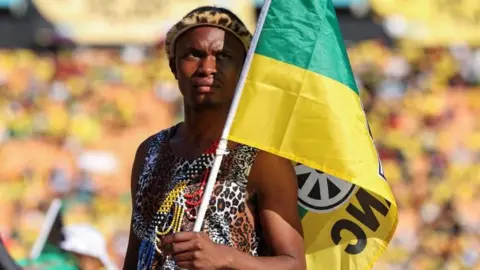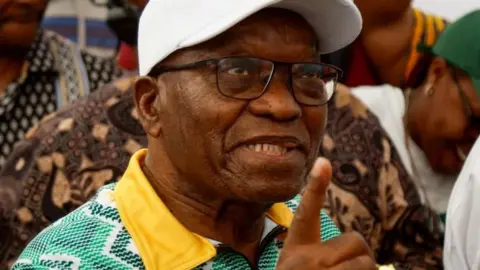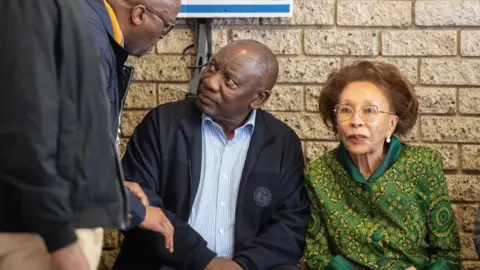Farouk Chothia,BBC Information, Johannesburg
 Reuters
ReutersSouth Africa’s governing African Nationwide Congress (ANC) seems set to lose its parliamentary majority for the primary time since Nelson Mandela led it to victory on the finish of the racist system of apartheid in 1994.
It could herald the tip of the celebration’s decades-long domination of South African politics, increase questions concerning the management of President Cyril Ramaphosa and usher in an period of coalition politics.
Listed below are three components that designate how South Africa received right here, why and what the longer term holds.
1) Behind the ANC’s free-fall
The ANC was as soon as a revered liberation motion etched within the hearts of South Africans, however after three a long time in energy it has turn out to be synonymous with corruption and unhealthy governance.
In consequence it was punished in Wednesday’s election, particularly by younger individuals who got here out in giant numbers to vote in opposition to the celebration – one thing they by no means did in earlier elections.
“They’re fed up with corruption, and are worst affected by unemployment. They turned on the ANC,” stated William Gumede, the chairman of the non-profit Democracy Works Basis.
It marks a generational divide in South Africa – their mother and father are nonetheless loyal to the ANC, as they lived by way of apartheid and know, first-hand, the ANC’s wealthy historical past as a liberation motion that freed black folks from the chains of apartheid.
However the ANC’s help amongst older voters has additionally declined, together with in its rural heartlands.
“The ANC misplaced help within the massive cities a very long time in the past. Now it’s shedding help in rural areas as nicely,” Prof Gumede instructed the BBC.
The ANC reached its electoral peak in 2004 when it gained 70% of the vote. It has misplaced help of three% or 4% in every election since then, reaching 57% within the 2019 ballot.
On this election, the collapse in its vote seems to be large – something from 8% to fifteen%.
2) The return of Zuma
 Reuters
ReutersSouth Africa’s former President Jacob Zuma, 82, is again with a vengeance.
He was ousted by the ANC in 2018, amid allegations of corruption, which he denied. He was succeeded by President Cyril Ramaphosa.
About three years later, he was sentenced to fifteen months in jail for contempt after he defied a courtroom order to seem earlier than an inquiry wanting into corruption throughout his nine-year presidency.
President Ramaphosa launched Mr Zuma after he served solely three months of his sentence in an try and placate him and his indignant supporters.
However he’s prone to rue the choice, as Mr Zuma returned to the political frontline below the banner of a brand new celebration, uMkhonto we Sizwe (MK), or Spear of the Nation.
Outcomes launched to this point counsel that the ANC has bled help largely to MK, which might take management of KwaZulu-Natal province.
If that is borne out by the ultimate end result, Mr Zuma would turn out to be the political don of the province and it might give him a base from the place to plot Mr Ramaphosa’s downfall – his key goal.
His conviction means he’s barred from taking a seat within the Nationwide Meeting however he’s nonetheless in a position to pull the strings from behind the scenes.
MK’s development is extraordinary. It was registered solely final September, with Mr Zuma asserting in December that he was becoming a member of it as he couldn’t vote for a Ramaphosa-led ANC. Since then it has shaken up South African politics in a approach that no new celebration has completed in such a brief interval because the finish of apartheid.
The South African Mail & Guardian newspaper’s KwaZulu-Natal correspondent, Paddy Harper, stated that MK had not solely eroded the ANC’s help, but in addition that of the unconventional Financial Freedom Fighters (EFF), South Africa’s third-biggest celebration till now.
Early outcomes counsel that MK is difficult it for third spot within the nationwide parliament.
In KwaZulu-Natal, the EFF’s remaining vote may very well be in single digits if present traits proceed, even if the celebration had launched its election marketing campaign within the province within the hope of rising there, Mr Harper instructed the BBC.
The EFF and MK advocate comparable financial insurance policies, together with the expropriation of white-owned land and nationalisation of key sectors of the economic system.
However Mr Zuma gained over EFF supporters in KwaZulu-Natal, his residence province.
He infused his marketing campaign with Zulu nationalism, invoking reminiscences of the nation’s founder, King Shaka, on the marketing campaign path.
The previous president additionally pledged to extend the powers of all of South Africa’s kings and chiefs, who at present have ceremonial powers and help the federal government to result in growth in rural areas the place they wield affect.
MK’s manifesto pledged to “expropriate all land with out compensation, transferring possession to the folks below the custodianship of the state and conventional leaders”.
MK additionally campaigned on Mr Zuma’s track-record in authorities, saying the economic system has worsened below Mr Ramaphosa.
MK supporters additionally criticise Mr Ramaphosa for imposing one of many world’s strictest lockdowns throughout the Covid pandemic, saying it worsened poverty and unemployment.
3) The daybreak of coalition politics
 EPA
EPASouth Africa’s revered Council for Scientific and Industrial Analysis (CSIR) and the News24 web site have projected that the ANC’s remaining vote may very well be round 42%.
If this develop into the case, the end result can be catastrophic for the ANC – and Mr Ramaphosa.
He might come below strain from the celebration to resign, along with his deputy, Paul Mashatile, being touted as a possible successor.
Mr Ramaphosa led the ANC right into a lacklustre election marketing campaign, and the celebration turned so determined that it received former President Thabo Mbeki – in addition to different retired celebration leaders – to hitch the marketing campaign in a bid to bolster its vote.
The president is broadly seen as weak and indecisive. He has defended himself by saying his focus was on “social compacting”, or constructing consensus.
“Those that would really like a president who’s dictatorial, who’s adventurous, who’s reckless, is not going to discover that in me,” he stated, whereas on the marketing campaign path.
Mr Ramaphosa’s possibilities of remaining in workplace will probably be stronger if the ANC will get between 45% and 50% of the ultimate vote.
That is the end result that many ANC members had resigned themselves to throughout the election marketing campaign, and stated the celebration might stay in energy in coalition with smaller events – just like the Inkatha Freedom Get together (IFP), which pulls its help primarily from ethnic Zulus in KwaZulu-Natal, or the Muslim Al Jama-ah celebration.
But when the ANC falls under 45%, it’s prone to want a giant celebration as a coalition accomplice.
This may very well be the EFF or the primary opposition Democratic Alliance (DA), which advocates centre-right insurance policies corresponding to larger privatisation and the scrapping of the minimal wage, and the IFP.
The DA’s help seems to have grown on this election, with the celebration having regained the votes of white individuals who backed a celebration to its proper within the final election, and a few black individuals who felt it wanted to be given an opportunity in nationwide authorities.
Any coalition deal at nationwide stage can be influenced by what occurs within the provinces – particularly essentially the most populous ones of KwaZulu-Natal and Gauteng, residence to Johannesburg and Pretoria.
The ANC might supply the DA and IFP a deal that might see the three events governing collectively at nationwide stage, and in KwaZulu-Natal.
“The DA and IFP have stored that possibility open to be able to maintain the EFF and MK out of presidency,” Mr Harper stated.
The ANC’s different possibility is strive type a coalition with the EFF within the nationwide authorities, in addition to in Gauteng, the place the ANC can be set to lose its outright majority.
ANC leaders in Gauteng, backed by Mr Mashatile, are stated to favor a coalition with the EFF.
Mr Malema, a former ANC youth chief, is outwardly open to the concept.
In South Africa’s Each day Maverick information website earlier this month, journalist Ferial Haffajee wrote that the EFF chief – who was beforehand convicted of hate speech for singing the anti-apartheid track Shoot the Boer [a reference to white farmers] – was “extra thought of and fewer fury-filled” throughout the election marketing campaign, and at a city corridor assembly in April, he expressed the view that the EFF’s pure coalition accomplice is the ANC.
“Even when the enterprise neighborhood and markets are spooked by an ANC-EFF coalition, its potential is clearly entrance and centre in Malema’s technique to get to the Union Buildings [the seat of government],” Ms Haffajee wrote.
“A part of the ANC helps a coalition with the EFF. On the similar time, Ramaphosa’s supporters within the ANC consider that such a coalition will trigger an existential disaster for the tradition of the outdated liberation motion,” she added.
So, powerful selections lie forward for the ANC following an election that sees South Africa enter a brand new period, with the opposition having the facility to make or break the federal government.

 Getty Pictures/BBC
Getty Pictures/BBC